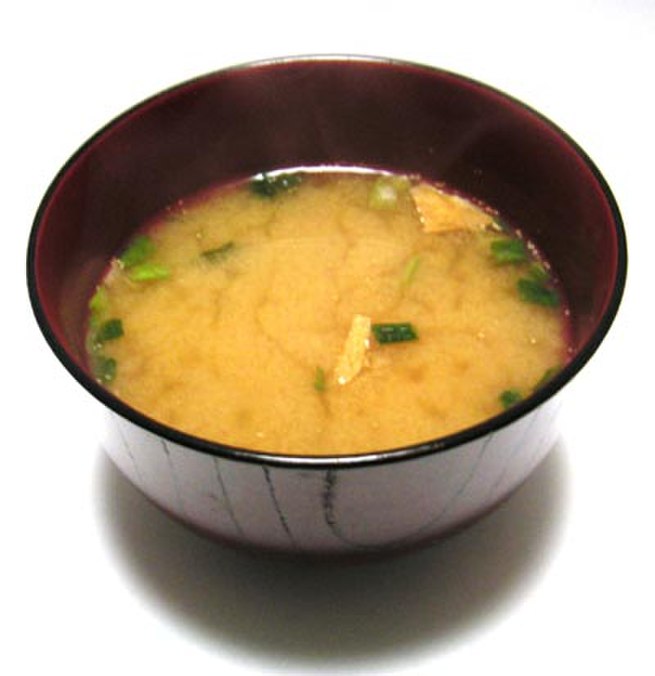
Main Difference
The main difference between Soup and Stew is that the Soup is a primarily liquid food and Stew is a combination of solid food ingredients that have been cooked in liquid and served in the resultant gravy.
-
Soup
Soup is a primarily liquid food, generally served warm or hot (but may be cool or cold), that is made by combining ingredients of meat or vegetables with stock, juice, water, or another liquid. Hot soups are additionally characterized by boiling solid ingredients in liquids in a pot until the flavors are extracted, forming a broth.
In traditional French cuisine, soups are classified into two main groups: clear soups and thick soups. The established French classifications of clear soups are bouillon and consommé. Thick soups are classified depending upon the type of thickening agent used: purées are vegetable soups thickened with starch; bisques are made from puréed shellfish or vegetables thickened with cream; cream soups may be thickened with béchamel sauce; and veloutés are thickened with eggs, butter, and cream. Other ingredients commonly used to thicken soups and broths include egg, rice, lentils, flour, and grains; many popular soups also include pumpkin, carrots, and potatoes.
Soups are similar to stews, and in some cases there may not be a clear distinction between the two; however, soups generally have more liquid (broth) than stews.
-
Stew
A stew is a combination of solid food ingredients that have been cooked in liquid and served in the resultant gravy. Ingredients in a stew can include any combination of vegetables (such as carrots, potatoes, onions, beans, peppers, mushrooms, and tomatoes) and may include meat, especially tougher meats suitable for slow-cooking, such as beef. Poultry, sausages, and seafood are also used. While water can be used as the stew-cooking liquid, stock is also common. Seasoning and flavourings may also be added. Stews are typically cooked at a relatively low temperature (simmered, not boiled), allowing flavours to mingle.
Stewing is suitable for the least tender cuts of meat that become tender and juicy with the slow moist heat method. This makes it popular in low-cost cooking. Cuts having a certain amount of marbling and gelatinous connective tissue give moist, juicy stews, while lean meat may easily become dry.
Stews are thickened by reduction or with flour, either by coating pieces of meat with flour before searing, or by using a roux or beurre manié, a dough consisting of equal parts of fat and flour. Thickeners like cornstarch or arrowroot may also be used.
Stews are similar to soups, and in some cases there may not be a clear distinction between the two. Generally, stews have less liquid than soups, are much thicker and require longer cooking over low heat. While soups are almost always served in a bowl, stews may be thick enough to be served on a plate with the gravy as a sauce over the solid ingredients.
-
Soup (noun)
Any of various dishes commonly made by combining liquids, such as water or stock with other ingredients, such as meat and vegetables, that contribute flavor and texture.
“Pho is a traditional Vietnamese soup.”
-
Soup (noun)
A serving of such a dish, typically in a bowl.
-
Soup (noun)
Any mixture or substance suggestive of soup consistency.
-
Soup (noun)
The liquid part of such a dish; the broth.
-
Soup (noun)
Thick fog or cloud (also pea soup).
-
Soup (noun)
Nitroglycerin or gelignite, especially when used for safe-cracking.
-
Soup (noun)
Dope (illicit drug, used for making horses run faster or to change their personality).
-
Soup (noun)
Processing chemicals into which film is dipped, such as developer.
-
Soup (noun)
Liquid or gelatinous substrate, especially the mixture of organic compounds that is believe to have played a role in the origin of life on Earth.
“primordial soup”
-
Soup (noun)
An unfortunate situation; trouble, problems (a fix, a mess); chaos.
-
Soup (noun)
alternative form of sup
-
Soup (verb)
To feed: to provide with soup or a meal.
-
Soup (verb)
To develop (film) in a (chemical) developing solution.
-
Soup (verb)
alternative form of sup
-
Soup (verb)
To sup or swallow.
-
Soup (verb)
To breathe out; to draw out.
-
Soup (verb)
To sweep.
-
Stew (noun)
A cooking-dish used for boiling; a cauldron. 14th-17thc.
-
Stew (noun)
A heated bath-room or steam-room; also, a hot bath. from 14thc.
-
Stew (noun)
A brothel. from 14thc.
-
Stew (noun)
A prostitute.
-
Stew (noun)
A dish cooked by stewing. from 18thc.
-
Stew (noun)
A pool in which fish are kept in preparation for eating; a stew pond.
-
Stew (noun)
An artificial bed of oysters.
-
Stew (noun)
A state of agitated excitement, worry, and/or confusion.
“to be in a stew”
-
Stew (noun)
A steward or stewardess on an airplane.
-
Stew (verb)
To cook (food) by slowly boiling or simmering.
“I’m going to stew some meat for the casserole.”
“The meat is stewing nicely.”
-
Stew (verb)
To brew (tea) for too long, so that the flavour becomes too strong.
-
Stew (verb)
To suffer under uncomfortably hot conditions.
-
Stew (verb)
To be in a state of elevated anxiety or anger.
